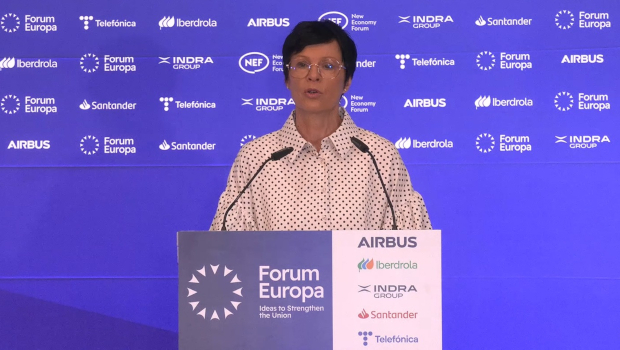European Commissioner for Enlargement, Marta Kos, emphasised this Tuesday at the Forum Europa in Brussels the importance of Moldova's accession process to the EU, as a check on Russia's sphere of influence.
Marta Kos stated this at a briefing organised by New Economy Forum in the EU capital, where she discussed, among other issues, Moldova's accession process to the EU.
Kos explained that the European Commission is working to open the first working groups with Ukraine and Moldova as soon as possible, with the aim, first and foremost, of building an independent judiciary "capable of effectively detecting corruption, guaranteeing the freedom and independence of the media, and ensuring fair public procurement".
The Commissioner noted that both Ukraine and Moldova met the criteria for opening the process and therefore deserve to move forward. “I would like to see the same commitment from all the candidates”, she asserted.
In the case of Moldova, she explained that she had just completed a three-day mission to the country, which suffered a gas supply cutoff by Russia in the winter, later trying to blame President Maia Sandu.
The objective was “to destabilise the government and discredit the country's European trajectory”. Therefore, the EU responded “forcefully”, providing Moldova with funding to help bring energy prices back down.
The EU also decided to begin integrating Moldova into the European electricity market, which will completely decouple it from the Russian energy market by the end of next year.
And thirdly, she emphasized, “we approached Moldova with full respect for its territorial integrity”, which included the separatist region of Transnistria, “where a humanitarian crisis was looming”.
For this reason, she said, “no one in Moldova was left without electricity or heating”. With this European action, they eliminated Russian propaganda, “demonstrating that in turbulent times, the EU is a reliable partner”.
The Commissioner highlighted Moldova's progress in its progression as a candidate and the fact that its government “is deeply committed to EU membership for a special reason”. “When we talk about insecurity or the role of security, we usually refer to Ukraine”, she noted, but warned about Moldova's importance: “If parliamentary elections are held in September and we lose in Moldova, Russian influence, or even the Russian military, could reach Europe's borders”.
During the recent mission to the country, the Commissioner explained, they also focused on winning the story against Kremlin propaganda, which tells Moldovans that they will lose their identity or that the EU will destroy local agriculture. Regarding the fear of losing national identity, she told Moldovans that her native language, Slovenian, is now one of the 24 official languages.
Kos said she went to the areas of the country where more than 90% voted against the EU in the referendum and worked to dispel the population's doubts, explaining that "the EU is not a charity; it doesn't just give money away, but we help countries develop". In her opinion, "if Moldova's growth plan works well, and I'm sure it will, we could double the country's GDP in 10 years and create 100,000 new jobs".












